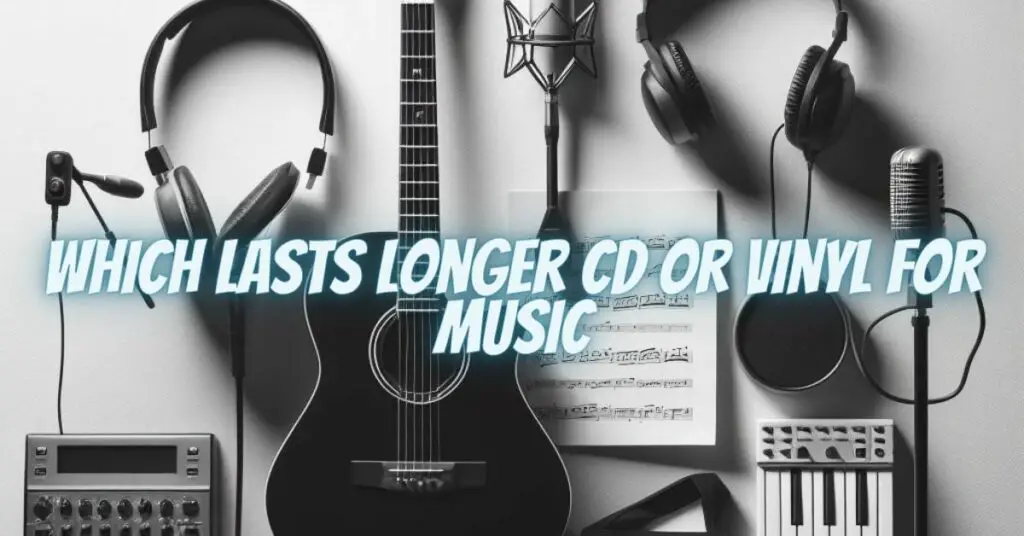When it comes to music storage, longevity is an essential factor for preserving audio quality and ensuring that collections stand the test of time. CDs and vinyl records are two popular physical formats, each with its own characteristics and durability. Here’s a detailed comparison of which lasts longer: CDs or vinyl records for music.
CD Longevity
- Material Composition:
- Polycarbonate Plastic: CDs are made from polycarbonate plastic with a reflective aluminum layer and a protective lacquer coating. This composition provides a certain level of durability but also introduces vulnerabilities.
- Susceptibility to Scratches: The reflective layer of a CD is close to the surface, making it susceptible to scratches that can affect data readability. Minor scratches can often be repaired, but deep scratches can cause permanent damage.
- Environmental Sensitivity:
- Heat and Humidity: CDs are sensitive to extreme temperatures and humidity, which can cause warping, delamination, or degradation of the reflective layer. Proper storage in a cool, dry environment can mitigate these risks.
- Light Exposure: Prolonged exposure to sunlight can damage the reflective layer and the protective coating of a CD, leading to data loss over time.
- Data Integrity and Lifespan:
- Digital Storage: CDs store music in a digital format using pits and lands that are read by a laser. This method provides precise and consistent audio reproduction.
- Estimated Lifespan: With proper handling and storage, CDs can last anywhere from 10 to 25 years. Higher-quality, commercially produced CDs tend to have a longer lifespan compared to writable CDs (CD-Rs), which typically last around 5 to 10 years.
Vinyl Longevity
- Material Composition:
- Polyvinyl Chloride (PVC): Vinyl records are made from polyvinyl chloride, a durable plastic that is relatively resistant to environmental factors but can wear down with repeated play.
- Groove Wear: Over time, the grooves of a vinyl record can wear down due to the friction from the stylus. High-quality turntables with properly aligned and maintained styluses can minimize this wear.
- Environmental Sensitivity:
- Heat and Warping: Vinyl records are highly sensitive to heat, which can cause warping and deformation. Storing records vertically in a cool, dry environment is essential to maintaining their shape and playability.
- Dust and Contaminants: Vinyl records attract dust and static, which can cause surface noise and affect playback quality. Regular cleaning and proper storage in protective sleeves can help preserve their condition.
- Audio Quality and Longevity:
- Analog Storage: Vinyl records store music in an analog format, which some audiophiles believe provides a warmer and more natural sound compared to digital formats. However, this sound quality can degrade with repeated plays if the record is not properly maintained.
- Estimated Lifespan: With careful handling and proper storage, vinyl records can last several decades, and even over a century. Unlike CDs, vinyl records are not prone to sudden data loss but may experience gradual degradation in audio quality.
Factors Influencing Longevity
- Handling and Maintenance:
- Proper Handling: Both CDs and vinyl records require careful handling to avoid scratches, dust, and other contaminants. Using appropriate storage methods, such as cases for CDs and sleeves for vinyl, is crucial.
- Regular Maintenance: Regular cleaning and maintenance can extend the lifespan of both formats. For vinyl, this includes using a record brush and occasionally deep-cleaning with specialized solutions. For CDs, keeping them free from fingerprints and storing them in protective cases is key.
- Playback Equipment:
- Quality of Equipment: The quality of playback equipment significantly affects the longevity of both CDs and vinyl records. High-quality CD players and turntables with properly maintained components can minimize wear and tear.
Conclusion
In terms of sheer longevity, vinyl records have the potential to outlast CDs if properly cared for. Vinyl records can remain playable for several decades, even over a century, with careful handling and storage. CDs, while offering more consistent digital sound quality, generally have a lifespan of 10 to 25 years under optimal conditions.
Ultimately, the choice between CDs and vinyl records comes down to personal preference, the importance of sound quality, and the level of care and maintenance one is willing to invest in preserving their music collection. Both formats offer unique advantages and require proper handling to ensure their longevity.

